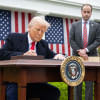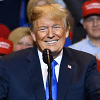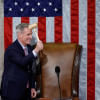Trump's train wreck

Donald Trump, the US Republican Party's presidential nominee, has again shaken up his campaign organisation. In doing so, he is revealing more about himself and his so-called management style than he may want people to see. Few presidential campaigns have featured such evident chaos and churn in personnel.
Two people who have never run a presidential campaign, and whose political instincts contradict each other's, are now running Trump's operation.
Kellyanne Conway, his new campaign manager, is a pollster who has been mining survey data from the mainstream Republican right for years (the party's right wing is its "mainstream," because its centre is essentially gone). During the Republican primary, she worked for the "super PAC" that backed Trump's bitter rival, Ted Cruz. Conway is a smart, tough partisan, who is expected to be a steady and sensible influence in the campaign. If she prevails – and Trump can stick to a theme – we'll see a more reasonable Republican candidate.
On the other hand, Trump's decision to appoint Steven Bannon as his campaign CEO foretells anything but steadiness and sensibility. Prior to his appointment, Bannon was the executive chairman of Breitbart News, a far-right, hyper-nationalist – indeed white supremacist – online publication. He is known to be a combative nihilist who will stoop to any depth to win.
Bannon's appointment caused mainstream Republican jaws to drop. Trump, trailing Hillary Clinton badly in August polls, has come under growing pressure to move closer to the Republican Party establishment. Unless he adopts a more mainstream approach, he will not be able to attract white suburbanites – a key constituency still up for grabs.
But Bannon is no fan of the Republican establishment. Under Bannon, Breitbart News routinely assailed Republican Speaker of the House Paul Ryan. Earlier this summer, it attacked Ryan for supporting an omnibus spending bill that funds President Barack Obama's Syrian refugee programme, and for sending his children to a private Catholic school. It even backed Ryan's Wisconsin congressional primary opponent, a Trump supporter whom Ryan defeated in an 84-16 percent landslide.
Breitbart News also condemned the Republican Senate leader, Mitch McConnell, publishing a column that accused McConnell of being soft on Clinton to remain in the good graces of donors who oppose Trump.
What has the Conway-Bannon dichotomy produced? Early signs suggest that Conway is sanding down some of Trump's rougher edges. For example, Trump, who never apologises, recently expressed vague "regret" for offending people. More important, Trump has been moving away from his tough anti-immigration stance, such as his pledge to establish a special "deportation force" to round up all 11 million undocumented immigrants in the US. What Trump is moving toward, however, remains unclear, as is whether his supporters will let him get away with this shift.
By contrast, Bannon apparently wants to "let Trump be Trump." He seems to support Trump's refusal to "pivot" from the divisive rhetoric of the primary season to a more "presidential" approach. Presumably, he hopes to free Trump to follow his basest instincts, spewing vile invective against Clinton as the election contest heats up. That won't go down well with the constituency that Conway is trying to win over to Trump.
There is little reason to think Trump's new staffing arrangement will yield a new, more coherent candidate. Throughout the campaign, he has vacillated wildly between poise and pugilism, sometimes in the same day.
Trump's appointment of Bannon, in particular, suggests that he is desperate, scared, and lost. Although it still isn't clear how much Trump actually wants to be president, we know that he hates to lose.
And yet he doesn't seem to understand the basics of presidential politics, nor the difference between the primary season and the main event. He still boasts that he defeated all of his Republican opponents, though, given how the primary process works, it's easier to beat 16 rivals than one or two.
Trump also confuses the enthusiastic supporters who attend his rallies with the presidential electorate. He seems not to comprehend that what he says to his ardent fans is heard by a much larger, and less sympathetic, public. This is a key reason why his poll ratings were plummeting by mid-August. And so he did what flailing candidates often do: he shook up the staff.
Bannon replaced Paul Manafort, who was close to the elites Bannon despises, and who had tried to strengthen Trump's ties to them. Manafort made the major misstep of trying to compel Trump to change, and of telling mainstream Republicans that he could manage the candidate. Even politicians without Trump's outsize ego would bridle at such talk.
By the time Manafort was replaced, Trump was ignoring his advice, and Manafort had essentially given up. In the meantime, Manafort's past as an adviser to and lobbyist for unsavoury dictators around the world was catching up with him. In one instance, he had worked for former Ukrainian President Viktor Yanukovych, a proxy for Russian President Vladimir Putin, who fled to Russia after being driven from power in 2014.
The US Justice Department has now started to scrutinise Manafort's lobbying activities in the US on behalf of Yanukovych, which posed yet another threat to the campaign. While Trump's influential children had initially favoured Manafort, that changed when he started to attract the wrong kind of media attention, including questions about Trump's so-far inexplicable affinity for Putin. Manafort may be gone from the Trump campaign, but his Ukrainian ties will be a matter of press interest for some time to come.
The 2016 presidential election isn't over, so it's still possible that Trump could end up in the White House. His poor judgment in people, glaringly apparent in recent weeks, is yet another reason why that is a dangerous possibility for American democracy.
The writer, a regular contributor to The New York Review of Books, is the author, most recently, of Washington Journal: Reporting Watergate and Richard Nixon's Downfall.
Copyright: Project Syndicate, 2016.
www.project-syndicate.org
(Exclusive to The Daily Star)

 For all latest news, follow The Daily Star's Google News channel.
For all latest news, follow The Daily Star's Google News channel. 








Comments